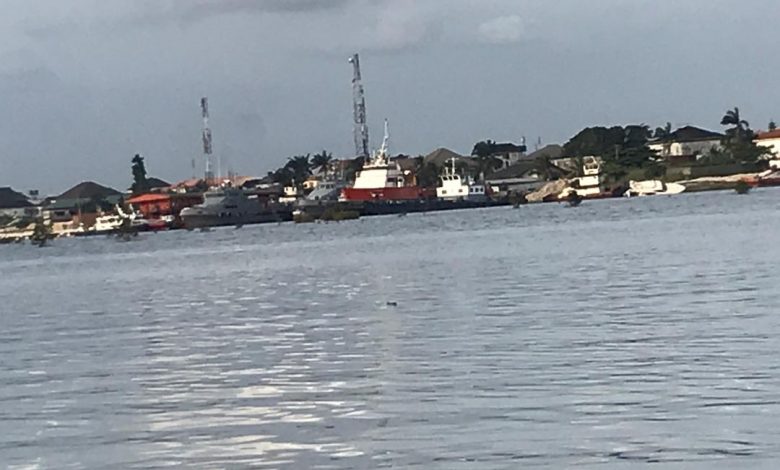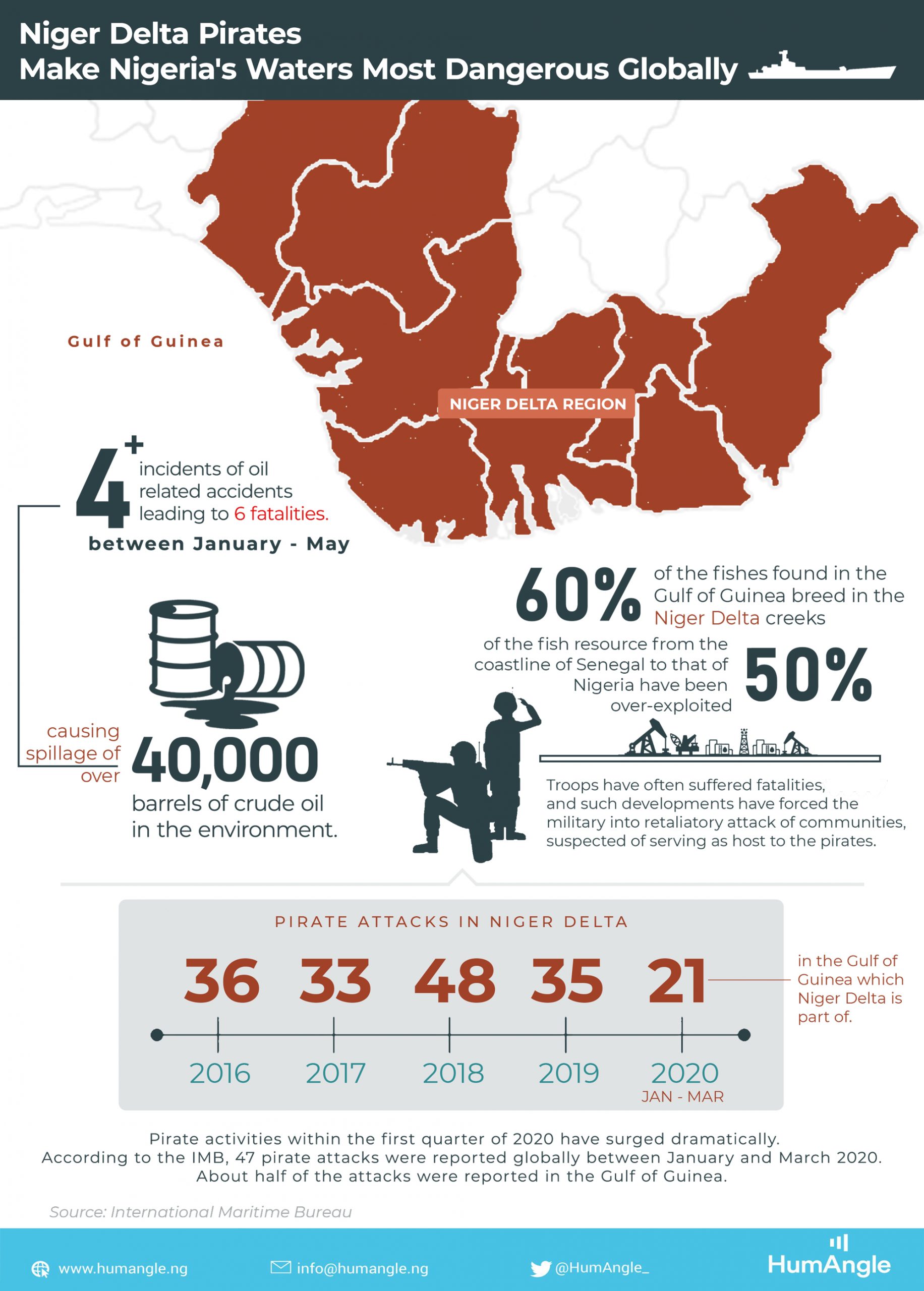Niger Delta Pirates Make Nigeria’s Waters Most Dangerous Globally

It was the week following the New Year festivities in 2020. The villages in the creeks of Bayelsa State were still radiant in the emblazons of the yuletide and people in their numbers were barely just returning to work from the holidays. It was a fit time for Sterling oil, a sector service company, to get its machinery into the field.
A dredger, MV AMBIKA, belonging to Sterling, had been set to work in the Ramos River. A group of pirates, the criminal gang that runs a duplicitous network of the region’s alternate economy, attacked the dredger and abducted three of the eight foreign crew members. When officers of the Nigerian Navy from the NNS Delta reported to the scene, the pirates greeted them with fierce, sweeping gunfire. Four of the six naval men were killed.
In response to this, the Nigerian military invaded the two communities of Bilabiri in Ekeremor Local Government Area of the state. As is common with the military, anger and embarrassment leaped out against a helpless community. It bore calamitous consequences. When the troops invaded Bilabiri, everyone, young or old, firm or weak was the target of military firepower.
Some weeks later in February, pirates along the waterways of Lutegbene community attacked soldiers escorting an oil barge from Port Harcourt to Warri, killing four and two civilians. In the manner of the fate that befell Bilabiri communities, the military reinforced and invaded Lutegbene community, Bayelsa State, killed and razed down private properties.
The Nigerian coastal waters of the Niger Delta, in the Gulf of Guinea, count among the most perilous water spaces in the world. International commercial haulage by vessels and trade depend a great deal on the safety of strategic water channels. The Nigerian coastal waters offer no such guarantees.
As a regular feature, the waters play host to some of the most vicious cells of sea pirates. Indeed, the Niger Delta coastal waters have been the hotbed of piracy for decades. The vast oil wealth that distinguishes the land and sea bed within the Niger Delta territory has largely been frittered away by corrupt politicians.
For instance, in April, a pirate attack on a passenger boat along the Akassa-Brass-Nembe waterways, left a government health worker on a COVID-19 sensitization trip with a gunshot wound. Within the same month of April, another pirate attack occurred in the Namasebi waterways in the Degema Local Government Area of Rivers State. The frequency of the attacks has made sea and river movements within the Niger Delta a treacherous enterprise.
HumAngle’s recent investigations reveal that a circle of unmet expectations for generations of local populations of the Niger Delta people has created a force of resistance that is taking the shape of a popular culture. Such unmet expectations, investigations show, have been injected into some sort of a folklore of social and political activism in the communities.
The reality of aggravated pollution on aquatic, land and air space has severed the people from traditional economic activities such as fishing and farming. HumAngle investigations reveal that between January and May 2020, not less than four incidents of major oil related accidents have been recorded leading to six fatalities.
The accidents, in addition, resulted in the spilling of over 40,000 barrels of crude oil into the environment. Community dwellers in the affected communities describe the effect of these environmental pollution on livelihood as “suffocating and dehumanising.” They neither could farm any longer on the greasy, oil-coated soil, nor fish in rivers with destroyed aquatic life,” observers say.
Stuck in an environment that literally holds no life, the people are condemned to a routine of daily desperation. Without a viable path to economic self-actualisation in legitimate sectors, the criminal cult of brigandage in the creeks and on the coastal waters, has begotten a compulsive attraction for young people.
This regular pool of recruits for the criminal groups continue to widen the space for wholesale criminality in the coastal and international waters of the Niger Delta. HumAngle investigations highlight the pirate groups operating from the Niger Delta region as the dominant source of attacks and insecurity on international commercial operations and interests in the Gulf of Guinea.
These attacks have not been limited to ships kilometres away from the Niger Delta coast, but have also affected local fisher-folk in the region and passengers on the Gulf of Guinea waterways. The Nigerian state’s attempt at putting a stop to the menace has led to violent confrontations at different times between the naval coastal corps and pirates. .
Troops have often suffered fatalities, and such developments have forced the military into retaliatory attacks on communities, suspected of serving as hosts to the pirates. Such military attacks on communities never failed to spur more young people to enlist in the criminal groups. It breeds the feeling within the communities of the moral anchor of a struggle against state persecution.
The water belt of the Niger Delta coastline is ranked among the exceptionally rich aquatic troves of the Gulf of Guinea. Experts believe that an estimated 60 per cent of the fishes found in the Gulf of Guinea breed in the Niger Delta creeks while over 50 per cent of the fish resource from the coastline of Senegal to Nigeria have been over-exploited mostly as a result of illegal, unreported and unregulated fishing.
A recent national data on human capital index released by the National Bureau of Statistics, (NBS), shows that the Niger Delta region accounts for a staggering five million people classified as unemployed. A significant part of the unemployed figure have probably received qualifying training from state agencies as seafarers.
They end up as pirates terrorizing vessels on the coastline and international waters. According to piracy data released by the International Maritime Bureau (IMB) for 2019, the international waterways flanking the Niger Delta coastline recorded the highest number of pirate attacks on vessels anywhere in the world between 2016 and 2019. The attacks recorded in the respective years were 36 pirate attacks in 2016, 33 pirate attacks in 2017, 48 pirate attacks in 2018, and 35 pirate attacks in 2019.
There was a drop in pirate attacks in 2019 compared to the previous year. Nevertheless, pirate activities within the first quarter of 2020 surged dramatically. According to the IMB, 47 pirate attacks were reported globally between January and March 2020. About half, specifically 21 of the attacks were reported in the Gulf of Guinea.
Ten vessels were reportedly fired upon in international waters globally within this period. Four of those reported incidents occurred within Nigeria’s exclusive economic zone in the first quarter of 2020.
Experts who are versed in pirate risks exposure index across international waters for vessels, pointed out that there were seasons during which the pirate activities spike exponentially.
A HumAngle source who prefers not to be named said: “it has been observed that during high oil prices, pirate attacks on oil tankers are usually high, while in periods of low oil prices like we currently have, crew members are targeted for ransom payments.”
Within the period between 2019 and this quarter, over 140 seafarers, (crew members in vessels) have been kidnapped for ransom by pirates in the Niger Delta.
The Nigerian government has been routinely criticized at international fora by stakeholders for not “doing enough” to stave off incessant pirate attacks in the Gulf of Guinea. For instance, Angus Frew, the departing CEO of the international ship owners, BIMCO, blamed Nigeria for failing to do enough to curb the alarming insecurity.
Support Our Journalism
There are millions of ordinary people affected by conflict in Africa whose stories are missing in the mainstream media. HumAngle is determined to tell those challenging and under-reported stories, hoping that the people impacted by these conflicts will find the safety and security they deserve.
To ensure that we continue to provide public service coverage, we have a small favour to ask you. We want you to be part of our journalistic endeavour by contributing a token to us.
Your donation will further promote a robust, free, and independent media.
Donate HereStay Closer To The Stories That Matter





